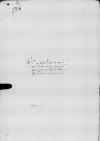Letter #2169
Ioannes DANTISCUS to Tiedemann GIESEHeilsberg (Lidzbark Warmiński), 1539-06-24
English register:
On the previous day, Dantiscus received from the Castellan of Gdańsk (Danzig) [Achatius von Zehmen (Cema)] an open letter to the King [Sigismund I Jagiellon] furnished with the signatures and seals of Giese, the Voivodes of Kulm (Chełmno) [Johann von Lusian (Jan Luzjański)], Marienburg (Malbork) [Georg von Baysen (Jerzy Bażyński)] and Pomerania [Jerzy Konopacki (Georg von Konopat)] and Zehmen himself, and also, in the same form, a second memo regarding the division of offices.
The Elbing (Elbląg) Town Council have notified Dantiscus that together with the Gdańsk Town Council they have drawn up a letter [to the King] in the same tone, and sent it to Thorn (Toruń). That is where Dantiscus’ messenger [Mauritius] is to collect it, and he has to go 20 miles out of his way because of it. Dantiscus sends Giese a copy of the burghers’ letter to the King, pointing out the semi-literateness of the scribe who wrote it.
On the way to the court, Dantiscus’ envoy will visit Giese. Dantiscus encourages Giese to dispatch his own letters by him, and especially to inform the Vice-Chancellor [Samuel Maciejowski] of the injustices he has suffered. Dantiscus emphasises that he also mentioned them in his own letter to the Vice-Chancellor. Later, after they confer, they can write about it together.
In Dantiscus’ view, nothing can be done about the fact that [Mikołaj Działyński, Castellan of Kulm] is breaking rank from the group [of Prussian councillors]. Since he has not been active in Prussian affairs so far, doubtless he will not get involved in future.
| received 1539-06-25 Manuscript sources:
Auxiliary sources:
Prints:
| ||||||||
Text & apparatus & commentary Plain text Text & commentary Text & apparatus
Reverendissimo in Christo Patri et Domino, domino
Reverendissime in Christo Pater et Domine, frater et amice carissime ac honorande.
Salutem et fraterni amoris commendationem.
Post cf.
Ceterum hodie
Lenivit tamen hunc cf.
Quod
Quam felicissime in Pylia diuturnitate valere cupio ex animo.
Datae
in multa scriptione festinanter ex
Reverendissimae Dominationis Vestrae {Reverendissimae} frater integerrimus
[1 ] Dantiscus means vital interests and privileges of

